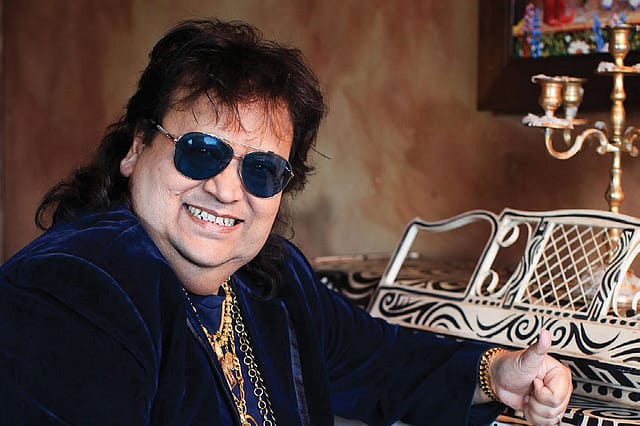Bappi Lahiri (1952-2022): Dancing to His Own Tune

MITHUN CHAKRABORTY IN a silver suit with a matching headband, girls in hot pants playing the saxophone, side dancers aiming their guitars like guns. He's a swivelling dancer. 'Zindagi mera gaana, main isi ka deewana/Life is my song, I am its lover,' he goes on.
That was Disco Dancer (1982), one of those B movies that has gone on to develop a committed fan base with its songs that are remixed from Los Angeles to London to Mumbai, from 'Auva auva koi yahan nache' to 'Jimmy Jimmy Jimmy aaja aaja'. The strobe lights, the glittery dresses, the John Travolta moves. It was our own Studio 54 moment, right up on big screen, so trashy that it was a treasure.
The man behind the songs? A portly gentleman with a pronounced Bengali accent, enough chains to embarrass a gold souk, and the ability to compose songs in seamless seconds. From Dr Dre to Cardi B ('Kaliyon ka chaman', Jyoti, 1981), from Badrinath Ki Dulhania ('Tamma tamma loge', Thanedaar, 1989) to Ittefaq ('Raat baaki', Namak Halaal, 1982), everyone loves a Bappi Lahiri remix. The movies were forgettable, but the songs acquired a life of their own. You could hear them anywhere and everywhere—in a fight scene with Adam Sandler and John Turturro in You Don't Mess with the Zohan (2008), or the title of a 2021 Netflix thriller, Raat Baaki Hai.
Imran Khan: Pakistan’s Prisoner
27 Feb 2026 - Vol 04 | Issue 60
The descent and despair of Imran Khan
Son of musicians, Bappi Lahiri's training was classical, and he famously started playing the tabla at the age of three. Think of him as the musical equivalent of Shammi Kapoor, his tunes leaping about and shimmying around, picturised on a set of imitators in the late '70s and '80s. To get a sense of the madness, all one has to do is to watch the wonder that is 'Nothing is Impossible'/'kehta hoon mai sach bilkul' from Tahir Hussain's Zakhmee (1975). The film itself, produced by Aamir Khan's father whom Lahiri called his Santa Claus, was a pale version of his brother's Yaadon Ki Baaraat (1973), but the sound of Kishore Kumar and Mohammed Rafi going wild, with the added bonus of Lahiri, is a masterpiece of cookiness. In an interview to Film Companion, Lahiri called it his "sixer" which transformed his career, followed by superhit songs from movies such as Chalte Chalte (1976, the memorable 'Kabhi alvida na kehna') and Aap Ki Khatir (1977, 'Pyaara ek bangla ho').
There were certain elements to Lahiri's music that made it relatable—the disco beats, the use of onomatopoeic words, the rhythmic engagement with the audience, and the simple words—'Bambai se aaya mera dost, dost ko salaam karo' (Aap Ki Khatir, 1977). He had the ability to add that extra zing to a song that elevated it from easy listening to earworm. Take the 'Ooh la la' song from The Dirty Picture (2011), picturised on a frenetic Naseeruddin Shah and an uninhibited Vidya Balan. Or, the hypnotically bad rap by Amitabh Bachchan in 'Jahan chaar yaar' (Sharaabi, 1984).
Certain elements of popular culture become campy, elevated from the ordinarily bad to the extraordinarily awful. Lahiri's music had the ability to be campy as well as sublime. There was a childlike curiosity about him, an enduring passion for the new. It came from his lineage—he was related to the Gangulys of Bollywood, specifically Kishore Kumar. It came from his love for global music trends. It came from his obsession with records. And it came from his boyhood worship of Elvis Presley.
Bappida (born Alokesh Lahiri) was cool much before Bollywood was. He was the best part of some unwatchable movies. He was the sweetest bit of some terribly choreographed songs. He was a singer, composer, lover of music. He was a Bengali at heart, a Mumbaikar by work, and an international musician by taste. He was a man who made everyone dance to his exceptional tunes, from Amitabh Bachchan to Madhuri Dixit, from Rajesh Khanna to Reena Roy. The disco king was a true rock star.
